The Works of Zwingli (7 vols.)
Digital Logos Edition
Overview
"This is the gospel, that sins are remitted in the name of Christ; and no heart ever received tidings more glad." Huldrych Zwingli's contribution to the Reformation may have been just as important as Luther and Calvin's, yet many still don't know much about him, let alone read his powerful works. Zwingli preached against ecclesial corruption, fasting, the requirement of celibacy on the clergy, the veneration of saints, excommunication, and more—setting the stage for the Swiss Reformation. The Works of Zwingli (7 vols.) assembles some of Zwingli's most important works translated into English and includes historical works about his life and legacy.
Included in this important collection are "A Short and Clear Exposition of the Christian Faith," "Commentary on the True and False Religion," "The Fable of the Ox," and many more works that solidified Zwingli's place in history as one of the Reformation's most influential voices. Samuel Jackson and Samuel Simpson's biographies of Zwingli help place Zwingli in the proper theological and political context. And Jim West's 'Christ Our Captain': An Introduction to Huldrych Zwingli provides original translations—the first time some of these have appeared in English—of excerpts from Zwingli‘s works on topics such as prayer, Christ, salvation, heaven, and more, along with commentary that illuminates the power and piety of Zwingli's work.
With the Logos edition of the Works of Zwingli (7 vols.), you can instantly access important information about dozens of prominent individuals and historical Christian events that have influenced—and continue to influence—the church. The advanced search tools in Logos Bible Software give you instant access to the subjects, topics, and individuals you’re looking for. All Scripture references are also linked directly to the Bibles in your library, making God’s Word instantly accessible.

- Key works from Huldrych Zwingli
- Introduction to Zwingli and new English works translated by Jim West
- Completely searchable and linked to your preferred Bible translation and other books in your library
- Title: The Works of Zwingli (7 vols.)
- Volumes: 7
- Pages: 1,988
This title is included in the following collections
You can save when you purchase this product as part of a collection.
Logos 5 Baptist Silver Legacy ...
$349.99$349.99Logos 5 Baptist Gold Legacy Li...
$849.99$849.99Logos 8 Reformed Platinum Lega...
$1,499.99$1,499.99Logos 6 Baptist Platinum Legac...
$1,499.99$1,499.99
- $1,499.99
- $1,499.99
- $2,999.99$2,249.99
- $2,999.99$2,249.99
- $2,999.99
- $2,999.99
- $2,999.99
- $2,999.99
- $2,999.99
- $4,749.99$3,562.49
- $4,749.99$3,562.49
- $4,749.99
- $4,749.99
- $11,399.99
- $11,399.99
- $23,999.99$17,999.99
- $21,749.99
- $24,999.99
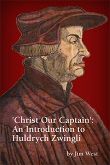
In 'Christ Our Captain', Jim West presents a succinct biography of the First Reformer of Switzerland before providing original translations of excerpts from some of Zwingli's most important writings—writings appearing here for the first time in English. Covering topics such as prayer, salvation, heaven, and more, West's translations emanate the clarity and power of Zwingli's voice, and his commentary helps contextualize and illuminate the pious nature of a man whom so few have read. 'Christ Our Captain' is a primary text for understanding the life and writings of Zwingli, and a must-have for Reformation studies.
Jim West’s book on Zwingli can be highly recommended to everyone who wants to learn more about the faith and thought of the man whose works contain the seed of Reformed theology. It bears all the traits of a good introduction to the subject: short, easy to read, and true to its title pointing out what was most important to Zwingli himself, not leaving the darker sides of Zwingli’s biography unattended, and last but not least, letting the Reformer’s own voice be heard.
Peter Opitz, Professor of Church History, Universität Zürich
Dr. Jim West is Adjunct Professor of Biblical Studies at the Quartz Hill School of Theology and Pastor of Petros Baptist Church, Petros, Tennessee. He has written a number of books, book reviews, and articles, is a member of several scholarly societies, and serves as Language Editor for the Scandinavian Journal of the Old Testament and Language Revision Editor for the Copenhagen International Seminar.
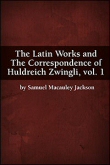
The three volumes in The Latin Works and The Correspondence of Huldreich Zwingli contain the English translations of some of Zwingli's most important letters, sermons, poems, tracts, and more. Each entry contains an introduction to the work and the editors have provided helpful notes. Volume one includes "The Original Life of Zwingli," a short biography written in 1521 by Oswald Myconius—the first biography of Zwingli to be written.
A translation of Zwingli's works, to be placed alongside of the works of Luther and Calvin, is a boon to English readers who would acquaint themselves with the secret of this great reformer's power.
—Homiletic Review
The editor's contribution shows that meticulous care in details which we have learned to expect from Dr. Jackson. It is a matter of congratulation that we are now to have in English a worthy presentation of the writings of a man whose appeal to the modern spirit is as direct as Luther's and is often much more in the temper of our approach to the problems not only of practical religion but of national honor.
—The Nation
Samuel Macauley Jackson (1851–1912) was educated at Princeton Theological Seminary and Union Seminary. He then studied for two years at the University of Leipzig, and then earned his DD from New York University. He served as an editor and author for numerous prestigious projects, including The American Church History Series, The New Schaff-Herzog Encyclopedia of Religious Thought, The Encyclopedia of Living Divines, and The Concise Dictionary of Religious Knowledge.
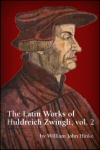
The three volumes in The Latin Works and The Correspondence of Huldreich Zwingli contain the English translations of some of Zwingli's most important letters, sermons, poems, tracts, and more. Each entry contains an introduction to the work and the editors have provided helpful notes. Volume two includes "A Short and Clear Exposition of the Christian Faith," "Declaration of Huldreich Zwingli Regarding Original Sin," and much more.
Samuel Macauley Jackson (1851–1912) was educated at Princeton Theological Seminary and Union Seminary. He then studied for two years at the University of Leipzig, and then earned his DD from New York University. He served as an editor and author for numerous prestigious projects, including The American Church History Series, The New Schaff-Herzog Encyclopedia of Religious Thought, The Encyclopedia of Living Divines, and The Concise Dictionary of Religious Knowledge.
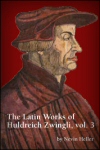
The three volumes in The Latin Works and The Correspondence of Huldreich Zwingli contain the English translations of some of Zwingli's most important letters, sermons, poems, tracts, and more. Each entry contains an introduction to the work and the editors have provided helpful notes. Volume three includes one of Zwingli's most powerful works: "Commentary on the True and False Religion."
Samuel Macauley Jackson (1851–1912) was educated at Princeton Theological Seminary and Union Seminary. He then studied for two years at the University of Leipzig, and then earned his DD from New York University. He served as an editor and author for numerous prestigious projects, including The American Church History Series, The New Schaff-Herzog Encyclopedia of Religious Thought, The Encyclopedia of Living Divines, and The Concise Dictionary of Religious Knowledge.

Filled with rich insight in the life and theology of Zwingli and containing numerous illustrations and photographs, Zwingli expert and historian Samuel Jackson provides an in-depth biography of one of the Reformation's unsung heroes. Also included in this edition is John Martin Vincent's essay "An Historical Survey of Switzerland before the Reformation" and an additional chapter on Zwingli's theology by Frank Hugh Foster.
Professor Jackson has made a noteworthy contribution to the material readily available for the study of the Swiss Reformation; a contribution the more to be welcomed from the fact that it does not merely consist of the conclusions of a single investigator, however scholarly and well-informed, but affords as well a large and comprehensive group of documents, bearing upon the life and work of Huldreich Zwingli, bringing the reader into a closer and more sympathetic contact with Swiss affairs, and enabling him in many particulars to corroborate or criticize the conclusions of the author and editor.
—The American Historical Review
The literary style of the writer is clear and delightful. The work is thorough and presents a new phase of Zwingli's many-sided life. In a masterly way he gathers from Zwingli's various works the Reformer's views on various subjects connected with education, such as the study of language, history, natural science, astronomy, mathematics, Hebrew, music. He closes with an interesting exposition of Zwingli's views on the education of women.
—The Presbyterian and Reformed Review
We are taken pleasantly and persuasively through the story of Zwingli's childhood and youth, his life at Glarus and Einsiedeln, his work in Zurich in its various stages, the first Cappel war and the Marburg Colloquy, the strenuousness of the later years, and the tragic close. The inner course of the Reformation movement is ably dealt with as well as its external incidents. The narration is made brighter and better by the numerous illustrations.
—The Critical Review of Theological and Philosophical Literature
The story gives us a strong man of thought and of actions, a man of strong loves and keen resentments, a clear-sighted patriot, a preacher of righteousness who was ready to face death for his preaching, a radical reformer who knew how to accommodate his unflinching purpose to the needs of practical prudence.
—The Saturday Review of Politics, Literature, Science, and Art
Every student of the Reformation period will find use for this volume.
—Wooster Bulletin
Dr. Jackson was uncommonly well equipped for writing Zwingli's life, by a critical and minute study of the original sources. He has produced a work which is at once erudite and brilliant.
—The Critic
Samuel Macauley Jackson (1851–1912) was educated at Princeton Theological Seminary and Union Seminary. He then studied for two years at the University of Leipzig, and then earned his DD from New York University. He served as an editor and author for numerous prestigious projects, including The American Church History Series, The New Schaff-Herzog Encyclopedia of Religious Thought, The Encyclopedia of Living Divines, and The Concise Dictionary of Religious Knowledge.
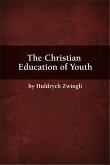
Huldrych Zwingli is well known as a reformer and theologian of the sixteenth century, but he is not so well known as an educator. Zwingli first wrote this treatise in Latin and it was printed at Basel in 1523, then again in 1526, with the full title of "How One Ought to Bring Up and Instruct Youth in Good Manners and Christian Discipline." The present English translation, together with a sketch of the educational life of Zwingli, will add new interest to the study of Christian education in the Reformation period.
This brief treatise was written by Zwingli to his stepson. It is a booklet of beautiful and correct advice to his ward. This is a small volume, but of far more value than its size would indicate.
—The Presbyterian and Reformed Review
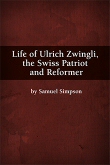
Simpson begins his biography of Zwingli with an introduction to the Reformation in Switzerland, and gives a great introduction to the points of union and divergence between Luther and Zwingli. Moving through Zwingli's birth to his death at The Second War of Cappel, Simpson provides keen insight into Zwingli's theology and the doctrinal differences that separated the German and Swiss Reformers.
No one can study that history, indeed, without soon confessing that Zwingli was a fine, bold, honest man, as fearless as Luther, a better scholar, and more self-controlled. Mr. Simpson takes advantage of the contrast; and the pages in which he works it out are the best in the book.
—The Church Quarterly Review
We like this Life of Ulrich Zwingli very well. It is written in a calm spirit and a clear manner. Mr. Simpson has, in fact, a strong sense of justice, a quality usually absent from theological affairs—combined with, and perhaps partly proceeding from, a careful study of the many sides of the subject. Mr. Simpson makes interesting comparisons between Luther and Zwingli, and sets forth their differences of doctrine with lucidity.
—The Critic
The religious history of Switzerland has significance all its own, significance which the present writer sees clearly and clearly presents to his readers. The story is well written and of high value. An extensive bibliography and a fair index add to its worth.
—The Christian Work and the Evangelist
Samuel Simpson (1868–1955) was educated at Oberlin Theological Seminary, Hartford Theological Seminary, and the University of Berlin. He was Associate Professor of American Church History at Hartford Theological Seminary from 1902–1909.

Huldrych Zwingli (1484–1531) was a notable Swiss leader of the Reformation. Born to a family of farmers in Wildhaus, Switzerland, Zwingli was educated at the University of Basel, where he earned a Master of Arts degree. Ordained in 1506, his first ecclesiastical post was in the town of Glarus where he stayed for ten years and got involved with politics during a turbulent time in Swiss history. He then took a position in the town of Einsiedeln, where he also furthered his study of Greek and Hebrew, as well as the works of Erasmus. Because of his reputation as a gifted preacher and writer, he was elected the stipendiary priest of Zurich.
Zwingli's theology matured during this period, and it began to show in his powerful sermons. He preached against ecclesial corruption, fasting, the requirement of celibacy on the clergy, the veneration of saints, excommunication, and more. In 1522, Zwingli published a sermon against fasting, "Von Erkiesen und Freiheit der Speisen" (Regarding the Choice and Freedom of Foods), which is considered by some historians to be the first act of the Swiss Reformation.
In 1529, the famous dispute over the interpretation of the Eucharist divided Martin Luther and Zwingli during the Marburg Colloquy, which resulted in two Protestant confessions. The Lutherans presented Charles V with the Augsburg confession, while Zwingli produced his own, "Fidei ratio" (Account of Faith). As the Reformation grew across Switzerland and other nearby countries, cantons (states) were split between those supporting Rome and those supporting the Reformation. On October 9, 1531, the city of Zurich was caught off guard by a declaration of war by an alliance of neighboring cantons known as the Five States (Lucerne, Uri, Schwyz, Unterwalden, and Zug). On October 11, Zwingli was among the 500 soldiers that died on the battlefield.
Reviews
14 ratings


Abner F. Hernandez
5/4/2019
These are amazing resources for a deep understanding of Zwingli's work, ministry, and theology. Thank you, Logos.
Kevin Bratcher
6/12/2018
Allan Story
5/5/2017

Dr. Justin B. Stodghill
1/2/2016
Brad Jarvis Willis
4/28/2015
AeliusCicero
6/19/2014

Justin Tollison
2/7/2014
Michael Maria Waldstein
12/7/2013

Bill Shewmaker
10/8/2013